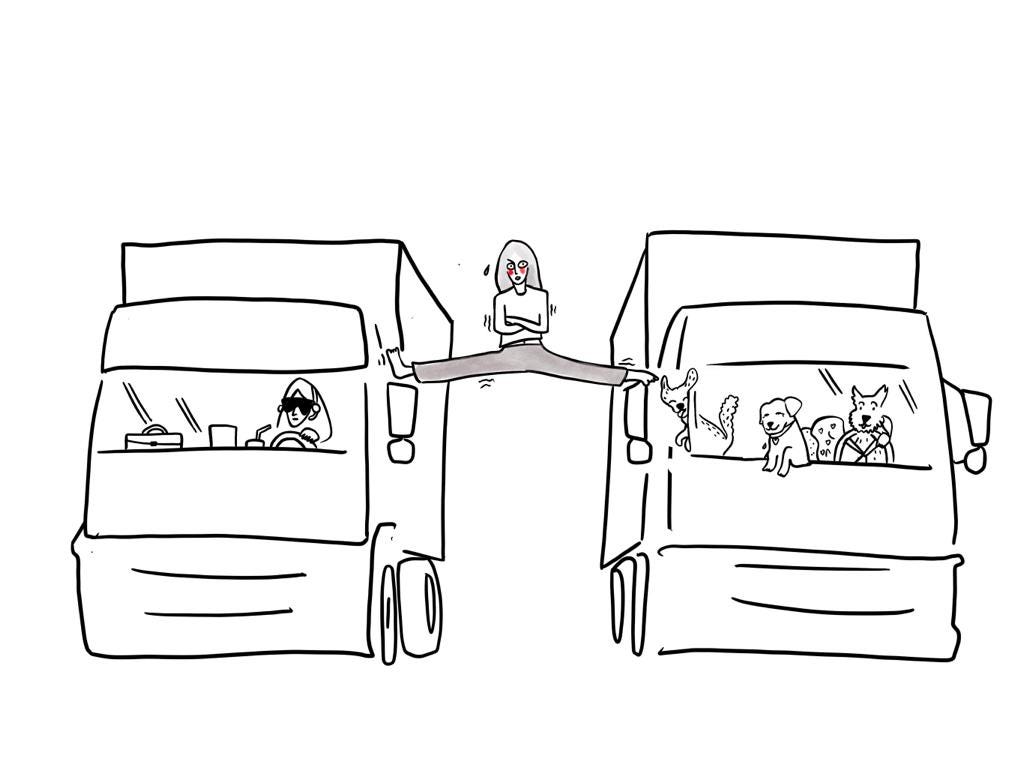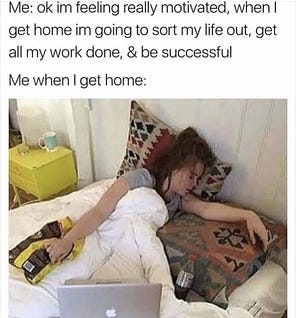Pleasure vs achievement
This is A-Mail. A newsletter about work and what it tells us about culture, technology and how we relate to one another. A-Mail is reader supported. Financial contributions help me to continue writing these posts and are a practical way of supporting my work. This time last year, I was trying to claw my way out of a rut. Professionally, I was struggling with my next step after finishing up a massive project. I was also adjusting after a big move out of the city. And this was all against the backdrop of the exit phase of the pandemic – when we collectively emerged from lockdown like survivors from a bunker, blinking in the harsh light; liberated but traumatised. In my search for something to help me navigate this ChAlLeNgInG time, I discovered “behavioural activation”, a cognitive behavioural therapy (CBT) tool used in the treatment of depression. The idea behind it is that by taking action first – instead of waiting for motivation to strike – you’ll see an uptick in your low mood. If it sounds like forcing yourself to do stuff when you don’t feel like doing it, that’s because that’s exactly what it is. You’re supposed to schedule your days with things you used to enjoy, as well as the responsibilities you have to uphold. It was tough but it worked. It helped get me to get past burnout and the state of blah I was in. Having moved out of the fog of burnout, I’ve been able to think more deeply about why this approach worked so well. Underpinning the concept of behavioural activation is a simple, but powerful philosophical idea: in order to have a fulfilling life, you need a mix of things that give you pleasure and achievement. When I say that out loud, it’s like duh!! but yet, somehow, it’s not that obvious to many of us. At least it wasn’t to me. There are some tasks we do that make us feel good because they give us a sense of mastery. Like hitting a work deadline or even putting on a load of laundry. To state the obvious, we also feel good when we do fun things like hanging out with friends or watching our favourite TV show. But you can't fill your days with things that only give you a sense of achievement, nor can you solely pursue the pleasurable. When you start out with behavioural activation, one of the first things you do is keep a log of your days and mark on a scale of one to 10 how much pleasure and achievement the various activities you’re doing give you. So for example, finishing a work project gave me a nine on the achievement scale but only a four on pleasure. Watching the latest episode of And Just Like That was an eight for pleasure but two for achievement (I like the reboot, don’t @ me). A precious few made me feel a high sense of both pleasure and achievement (showers and reading were both nines across the board). But my biggest takeaway from the tracking exercise was how little time I make for pleasurable activities. I tend to leave doing things I enjoy until the fag end of my day after I've done everything else. Inevitably, that means I’ll tell myself I’ll do something fun after work, but then I’ll be too tired from getting everything else done to do it. I can’t help but think of pleasure as frivolous. I associate it with immediate gratification and self-indulgence. I also find it kind of embarrassing to use the word “pleasurable” to categorise my daily activities. It makes me think of writing “masturbate” on a to-do list. I could sub in the word “enjoyment” instead, but I know that this struggle with the term “pleasurable” is something worth unpacking so I make a point to use it. The more I think about how to define pleasure, the slipperier the concept feels. In a philosophical meditation on how to think about pleasure, Sam Dresser writes:
I used to see pleasure and achievement as being in opposition to each other. This was because I distinguished between feeling good and feeling productive and regarded the latter as superior; the more noble pursuit. However, I realise now that both pleasure and achievement can be sources of happiness, and that a balanced approach to both can lead to a more fulfilling life. Don’t think I’m about to conclude by saying that in order to be happy, you need to find balance. The “find a balance!” brand of life advice is like telling someone who’s depressed to “just be happy.” For starters, I personally find that the moment I actively try to seek out balance, I immediately feel imbalanced. Moreover, it flattens the complexity of the situation. The relationship between pleasure and achievement is fraught with tension. Sometimes you pursue one at the expense of the other; like when I curtail my social life to focus on an important work project. Other times, you find a way to integrate them, like when I listen to a podcast while doing the dishes. The two also aren’t fixed states; I can find the same activity pleasurable sometimes and at others, it gets me a sense of achievement. That fluidity is most pronounced for me in writing. So rather than strive for balance, perhaps what we need instead is a more nuanced understanding of what it means to be fulfilled. And rather than pitting pleasure against achievement, we accept that we have to awkwardly straddle both, as uncomfortable as that may feel. |



Commentaires
Enregistrer un commentaire
Thank you to leave a comment on my site